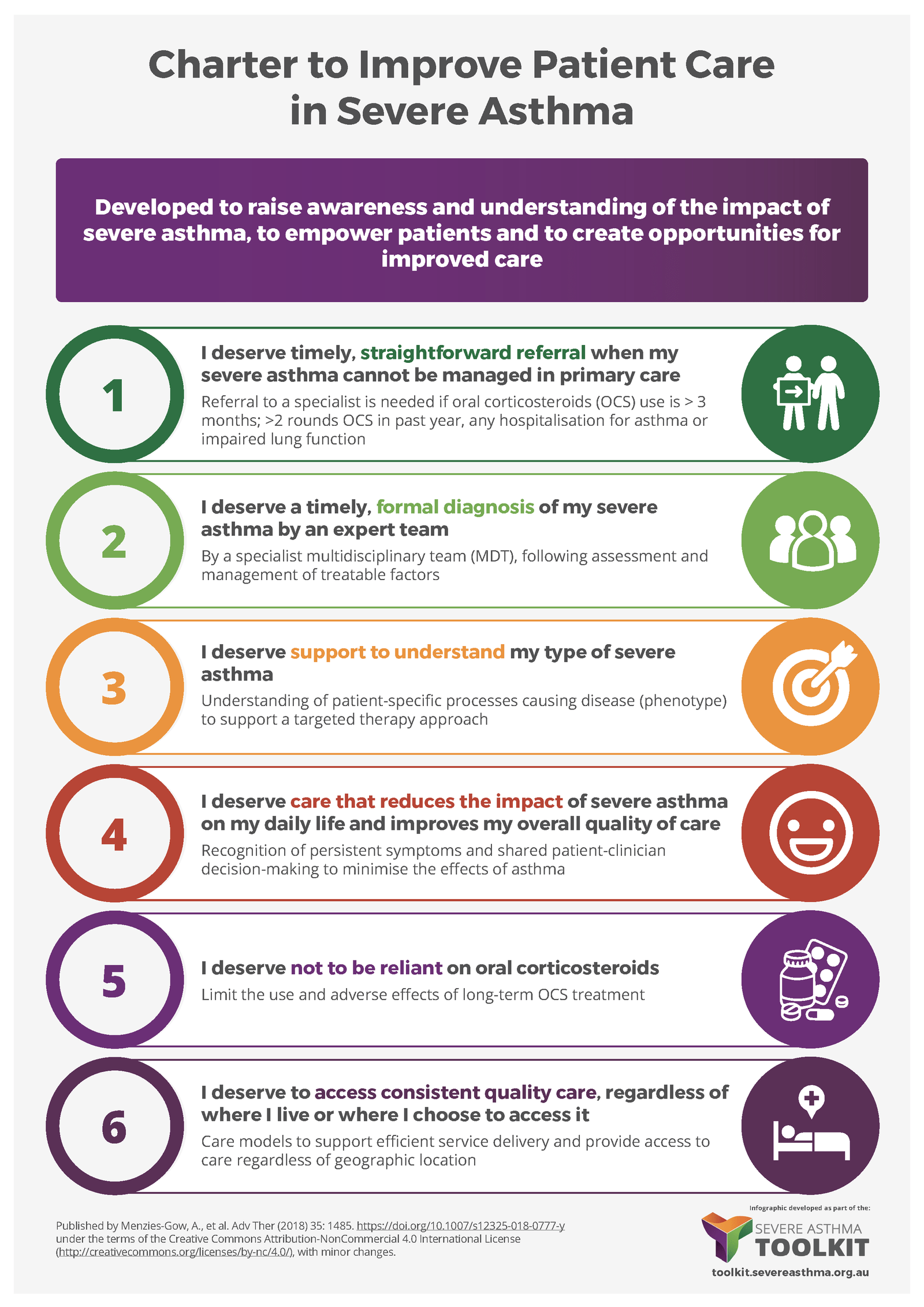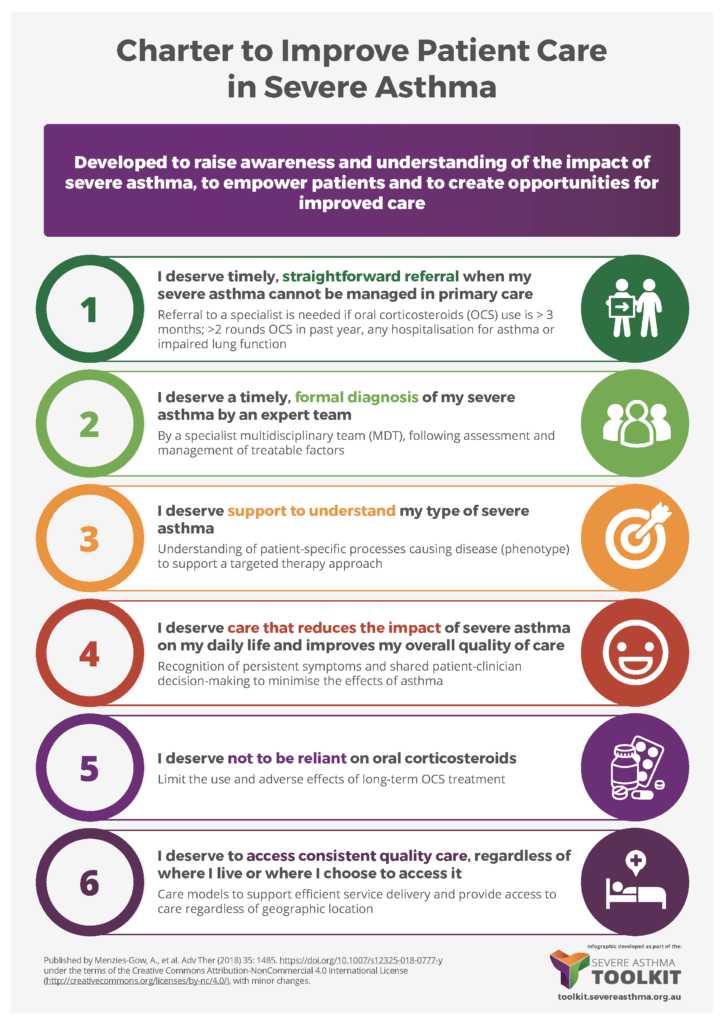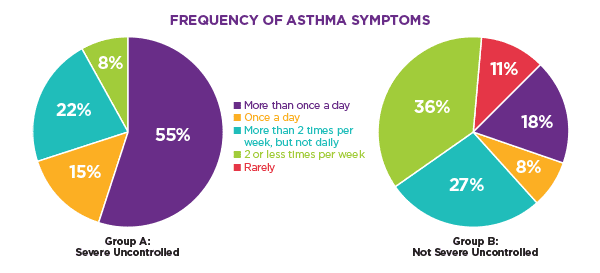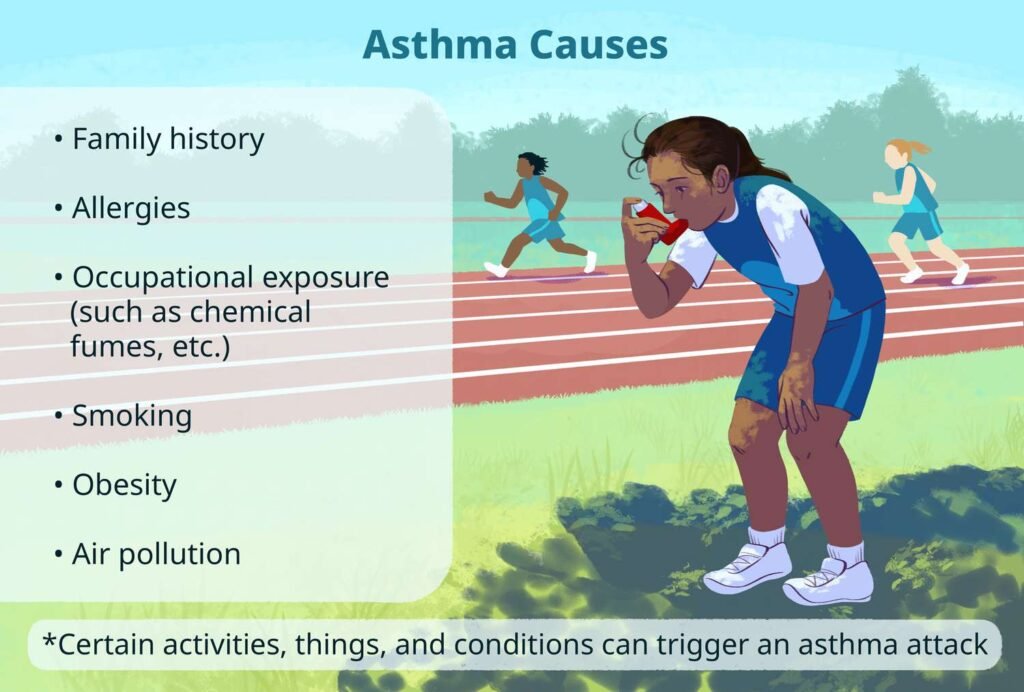
Living with asthma can present unique challenges, but it doesn’t mean that you can’t lead a fulfilling and active life. In this article, we’ll explore what it’s like to live with asthma on a daily basis, highlighting the various aspects that you may encounter. From managing symptoms and medications to adapting your lifestyle to accommodate your condition, we’ll discuss how you can navigate the daily ups and downs of asthma while still enjoying all that life has to offer. So, put on your glasses and take a deep breath, because we’re about to embark on a journey to discover what daily life is truly like with asthma.

Managing Asthma Triggers
Identifying common triggers
Daily life with asthma involves being aware of the triggers that can worsen your symptoms. Common triggers include allergens such as pollen, pet dander, and dust mites, as well as respiratory infections, cold air, smoke, and certain chemicals. By paying attention to your symptoms and noting when they are triggered, you can begin to identify the specific factors that may be exacerbating your asthma.
Avoiding triggers in daily life
Once you have identified your asthma triggers, it’s important to take steps to avoid them as much as possible. This may involve making simple changes to your daily routine, such as using allergy-proof bedding, keeping windows closed during high pollen seasons, and avoiding exposure to smoke or strong odors. It’s also essential to maintain good indoor air quality by regularly cleaning your living space, using air filters, and keeping humidity levels in check.
Developing an asthma action plan
To effectively manage your asthma, it’s crucial to work with your healthcare provider to develop an individualized asthma action plan. This plan will outline the steps you should take to manage your symptoms, including what medications to take and when, as well as what to do in case of a flare-up or emergency. By following your asthma action plan, you can have a clear and organized approach to managing your condition and reducing the impact it has on your daily life.
Medications and Treatment
Using inhalers correctly
Inhalers are a common form of medication for asthma treatment, but it’s important to use them correctly to ensure their effectiveness. Make sure you understand how to correctly use your inhaler, as improper technique can lead to insufficient medication delivery. This includes techniques such as proper hand positioning, coordinating your inhalation with the release of the medication, and holding your breath for a few seconds after inhalation. If you have any doubts or concerns, don’t hesitate to ask your healthcare provider or pharmacist for a demonstration.
Taking prescribed medications
Consistently taking your prescribed medications as directed by your healthcare provider is essential for managing your asthma and preventing flare-ups. This may involve using daily controller medications to keep your symptoms under control, as well as having a rescue inhaler on hand for immediate relief during flare-ups. It’s important to establish a routine and stick to it, incorporating your medications into your daily life to ensure their effectiveness.
Follow-up visits with healthcare provider
Regular follow-up visits with your healthcare provider are crucial for monitoring your asthma and adjusting your treatment plan as needed. These appointments provide an opportunity to discuss any changes in symptoms, address concerns, and ensure that your medications are still appropriate for your condition. By attending these follow-up visits, you can work together with your healthcare provider to keep your asthma well-managed and minimize its impact on your daily life.
Physical Activity and Exercise
Importance of staying active
Despite having asthma, it’s important to stay physically active and engage in regular exercise. Exercise can help improve lung function, strengthen respiratory muscles, and enhance overall fitness. Regular physical activity can also help manage weight, reduce stress, and improve overall well-being. It’s important to remember that having asthma doesn’t mean you have to avoid physical activity altogether. However, it’s advisable to discuss with your healthcare provider what exercises are safe for you and to establish a suitable exercise plan.
Choosing exercise that suits your condition
When choosing an exercise routine, it’s important to consider the specific needs and limitations of your asthma. While some individuals with asthma may tolerate aerobic activities like walking, jogging, or swimming well, others may find that anaerobic activities like weightlifting or high-intensity interval training (HIIT) trigger their symptoms. It’s important to listen to your body and choose exercises that suit your condition. Always warm up before exercising and consider using your rescue inhaler as a preventive measure before engaging in physical activity.
Precautions to take before and during exercise
Before starting any exercise routine, it’s important to take certain precautions to minimize the risk of an asthma attack. This may involve warming up properly, wearing a scarf or mask to warm up the air you breathe in cold weather, and avoiding exercising in areas with high pollution levels or allergens. During exercise, make sure to pace yourself, take breaks if needed, and pay attention to any warning signs or symptoms. It’s also important to always have your rescue inhaler with you in case of a flare-up.
Impact on Sleep
Difficulty in falling asleep
Asthma can sometimes make it challenging to fall asleep due to symptoms such as coughing, wheezing, and shortness of breath. To improve your sleep quality, it’s important to establish a relaxing bedtime routine and create a comfortable sleep environment. This may involve keeping your bedroom cool, dark, and free from allergens, using hypoallergenic bedding, and employing relaxation techniques such as deep breathing or meditation before bedtime.
Waking up due to coughing or wheezing
If you wake up during the night due to coughing or wheezing, it’s essential to have a plan in place to manage your symptoms effectively. This may involve using your rescue inhaler, sitting up to help facilitate breathing, or using other prescribed nighttime asthma treatments if recommended by your healthcare provider. It’s important to follow your asthma action plan and communicate any nighttime symptoms with your healthcare provider during your follow-up visits.
Using nighttime asthma treatments
In some cases, your healthcare provider may recommend specific nighttime asthma treatments to help manage your symptoms and improve your sleep quality. These treatments may include long-acting bronchodilators, inhaled corticosteroids, or other medications that can help control inflammation and open up the airways. It’s crucial to follow your healthcare provider’s guidance and use these treatments as prescribed to minimize nighttime symptoms and promote better sleep.

Dealing with Symptoms
Shortness of breath
Shortness of breath is a common symptom of asthma, and learning how to manage it effectively is key to maintaining your daily life. One technique that can help manage shortness of breath is pursed-lip breathing, which involves inhaling slowly through the nose and exhaling through pursed lips. This can help regulate breathing and reduce breathlessness. It’s also important to use your prescribed medications as directed, such as bronchodilators, to help open up the airways and alleviate shortness of breath.
Coughing and wheezing
Coughing and wheezing are hallmark symptoms of asthma, and managing them is essential for daily life. To manage coughing and wheezing, it’s important to avoid triggers that can worsen these symptoms, such as smoke, allergens, or respiratory infections. In addition, following your prescribed treatment plan and using your medications regularly can help alleviate coughing and wheezing. If coughing or wheezing becomes severe or persists despite medication use, it’s important to contact your healthcare provider for further evaluation and guidance.
Chest tightness
Chest tightness is another common symptom of asthma and can be uncomfortable or distressing. To alleviate chest tightness, it’s important to use your prescribed medications as directed, including bronchodilators and anti-inflammatory medications. Engaging in relaxation techniques, such as deep breathing or mindfulness exercises, can also help reduce chest tightness. If chest tightness worsens or becomes severe, it’s important to seek medical attention to ensure appropriate management.
Managing Work and School
Informing employers and teachers about asthma
If you have asthma, it’s important to inform your employers and teachers about your condition. By educating them about asthma, they can better understand your needs and provide appropriate accommodations. This may involve informing them about your triggers, providing a copy of your asthma action plan, and discussing any necessary modifications to your work environment or school activities.
Accommodations and support at work/school
Once your employers or teachers are aware of your asthma, they can work with you to provide necessary accommodations and support. This may include ensuring good indoor air quality, allowing for breaks as needed, providing a quiet and conducive environment for learning or working, and allowing for flexibility in scheduling appointments or taking medications. It’s important to communicate any changes in your symptoms or needs regularly to ensure ongoing support.
Knowing your rights as a person with asthma
As a person with asthma, it’s important to be aware of your rights and protections in the workplace or educational setting. Familiarize yourself with the laws and regulations pertaining to individuals with disabilities, such as the Americans with Disabilities Act (ADA) in the United States or similar legislation in your country. Knowing your rights can empower you to advocate for the accommodations and support you need to effectively manage your asthma while at work or school.

Handling Emotional Well-being
Stress and anxiety related to asthma
Living with asthma can sometimes lead to increased stress and anxiety due to concerns about symptom management, flare-ups, and the impact on daily life. It’s important to recognize and address these emotional challenges. Practice stress management techniques such as deep breathing, meditation, or engaging in hobbies or activities that help you relax. Seeking support from friends, family, or support groups can also provide emotional relief and help you navigate the emotional aspects of living with asthma.
Talking to a support system
Having a support system can be invaluable in managing the emotional well-being of individuals with asthma. Talk to your friends, family, and loved ones about your condition and how it affects your daily life. Share your concerns, frustrations, and successes, and let them provide the support and encouragement you need. Knowing that you have a network of people who understand and care about your well-being can greatly improve your emotional resilience in dealing with asthma.
Seeking professional help if needed
If you find that stress, anxiety, or other emotional challenges related to your asthma are overwhelming or interfering with your daily life, don’t hesitate to seek professional help. Mental health professionals, such as therapists or counselors, can provide the support and guidance you need to navigate the emotional aspects of managing asthma. They can help you develop coping strategies and provide a safe space to discuss any concerns or fears you may have.
Maintaining a Healthy Diet
Foods to include and avoid
Maintaining a healthy diet is essential for overall well-being, and it can also have an impact on asthma symptoms. Some foods have been associated with triggering asthma symptoms in certain individuals, such as dairy products, processed foods, and foods high in sulfites. On the other hand, incorporating foods rich in antioxidants, such as fruits, vegetables, and omega-3 fatty acids, may help reduce inflammation and improve lung function. It’s important to listen to your body and identify any specific food triggers that worsen your asthma symptoms.
Importance of a balanced diet
In addition to avoiding potential trigger foods, maintaining a balanced and nutritious diet is crucial for individuals with asthma. Eating a variety of fruits, vegetables, whole grains, lean protein, and healthy fats can help support overall health and provide the necessary nutrients for optimal lung function. It’s important to consult with a healthcare provider or a registered dietitian to develop a personalized dietary plan that suits your specific nutritional needs.
Effect of diet on asthma symptoms
While specific dietary recommendations may vary from person to person, there is evidence to suggest that certain dietary patterns can have a positive impact on asthma symptoms. Eating a diet rich in fruits and vegetables, for example, has been associated with a reduced risk of asthma symptoms and improved lung function. It’s important to pay attention to your individual responses to different foods and make adjustments as needed to optimize your asthma management.

Traveling with Asthma
Planning ahead for medications and supplies
When traveling with asthma, it’s crucial to plan ahead to ensure that you have an adequate supply of medications and necessary medical supplies. Make sure to pack your medications in your carry-on luggage to have them readily available during your journey. It’s also advisable to pack extra doses in case of unforeseen delays or loss of luggage. Consider carrying a written copy of your asthma action plan with contact information for your healthcare provider in case of emergencies.
Dealing with different climates and environments
Traveling to different climates or environments can pose unique challenges for individuals with asthma. It’s important to be aware of potential triggers in the new environment, such as pollen, humidity levels, or air pollution. Plan accordingly by researching the climate and air quality of your destination and take appropriate precautions, such as wearing a mask or adjusting your medications as recommended by your healthcare provider. Be prepared to modify your activities or seek medical assistance if your symptoms worsen.
Knowing emergency contacts in the destination
Before traveling, it’s important to familiarize yourself with emergency contacts in your destination. This includes identifying local healthcare facilities or hospitals and understanding how to access medical assistance if needed. Researching local emergency services and carrying a list of emergency contacts can provide peace of mind and ensure that you have the necessary support in the event of an asthma emergency while traveling.
Educating Others about Asthma
Advocacy and raising awareness
One of the ways to make a positive impact in the lives of individuals with asthma is through advocacy and raising awareness. Share your personal experiences, educate others about the challenges of living with asthma, and promote understanding and empathy. Participate in local or national advocacy initiatives, support asthma research organizations, and join support groups to connect with other individuals with asthma and collectively work towards improving asthma management and quality of life.
Teaching friends and family about asthma
Educating your friends and family about asthma can help them better understand your condition and provide necessary support. Share information about asthma triggers, medications, and your individual management plan. Help them recognize the signs of an asthma attack and provide guidance on how to assist you if needed. By teaching your loved ones about asthma, you can create a supportive and informed network around you.
Explaining asthma management to others
Helping others understand the importance of asthma management is crucial for raising awareness and potentially preventing serious flare-ups. Explain the fundamentals of asthma management, such as the proper use of rescue inhalers, the importance of following prescribed medications, and the significance of an asthma action plan. By educating others, you can empower them to recognize and respond appropriately to asthma symptoms, potentially saving lives and improving overall asthma management in society.
In conclusion, daily life with asthma involves effectively managing triggers, following prescribed medications and treatment, staying physically active with suitable precautions, addressing sleep disruptions, dealing with symptoms, managing work and school responsibilities, looking after emotional well-being, maintaining a healthy diet, traveling with adequate preparations, and educating others about asthma. By implementing these strategies and seeking proper support, individuals with asthma can lead fulfilling lives while effectively managing their condition.










